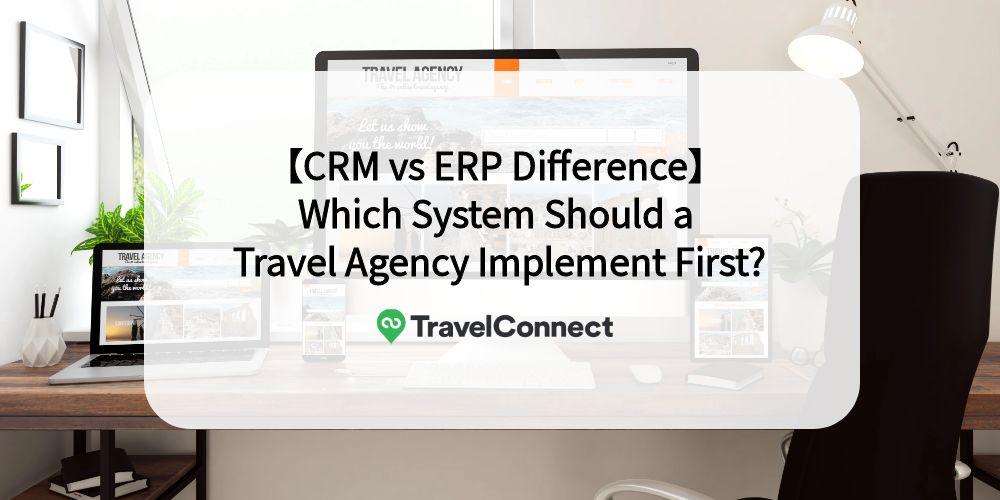Running a travel agency, whether you’re specializing in individual tours, group tours, or ticket wholesale, you often face the question: What’s the difference between CRM and ERP? Which should I choose first? Or should I choose both? Don’t worry, this article will clarify everything!
What’s the Difference Between CRM and ERP?
For travel companies, CRM (Customer Relationship Management) primarily records and tracks customer information, registration records, interaction records, quote history, and even after-sales care. Simply put, it records every customer interaction, helping you make more personalized marketing and service decisions.
What about ERP (Enterprise Resource Planning)? It helps you manage your accounting, process invoices, reconcile accounts, calculate costs, and even integrate payment processes with suppliers (such as airlines and hotels). It’s responsible for the efficiency and compliance of your company’s internal operations.
Some say, “CRM is the front office, ERP is the back office”—and this saying couldn’t be more true for travel companies.
What do CRM and ERP have in Common?
Although CRM and ERP serve different purposes, they actually share many similarities, especially in their technical architecture. A key commonality between CRM and ERP is that, whether you’re using CRM to manage customer registration records or ERP for group expenses, both systems are fundamentally built on relational databases. In other words, they’re both data-centric tools that help you analyze, track, and optimize business decisions.
CRM vs. ERP: How Should You Choose? Which Should a Travel Agency Choose?
It really depends on your company’s type:
- If you handle a large volume of customer inquiries, quotes, and registrations daily, a travel agency CRM system is recommended.
- If you have complex financial processes, supplier settlement pressures, or even multiple branches, a travel agency ERP system is recommended.
- Don’t want to hassle yourself and want to achieve everything in one go? Consider using both, or find a platform that integrates CRM and ERP functionality.
CRM and ERP aren’t mutually exclusive options; rather, they’re both valuable tools that can help you retain customers and maintain financial stability. If you’re a travel company looking to grow, expand, or even automate, the sooner you start planning, the sooner you can avoid problems like information disarray, financial errors, and staffing shortages.
In today’s fiercely competitive travel market, effective systems not only save time but are also crucial for improving customer experience and decision-making quality. You don’t necessarily need to build both systems right away, but you must understand that CRM is the facade and ERP is the core. Without either, the long-term balance will be unbalanced.
Why Choose TravelConnect?
Because we’re more than just a system maker; we’re a technology provider that truly understands travel operations. Our two major systems:
- ✅ TripOptimizer: Directly connects to major global distribution systems, including Travelport Galileo, Worldspan, Amadeus, Sabre, TravelSky, and others. No need to switch screens or manually copy data, the entire booking and dispatch process is fully automated.
- ✅ ReadyBook: Not only does it connect to GDSs, it also supports API integration with low-cost carriers (LCCs) and local wholesalers. From one platform, you can access global airfares, quotes, and real-time inventory. We’ve got you covered, from OTAs, direct airline sales, and even exclusive Hong Kong local rates.
What’s more, TravelConnect is its own ticketing supplier! Not only can you apply for a GDS account faster, but you can also directly access our airfare resources (with higher commissions than going itinerary with a supplier yourself).
Whether you’re:
- A small travel agency just transitioning to online booking
- A B2B ticket wholesaler
- Or a mid-to-large travel platform looking to integrate its itinerary, ticketing, registration, and customer service
Rather than spending the money to implement a separate CRM and ERP system and worry about data synchronization and API integration, go directly to TravelConnect and solve the three pain points of “system,” “ticket sources,” and “supplier integration” all at once.
Want to know how to apply for a GDS account, integrate with a ticketing system, or integrate your existing product pages? Contact us!

